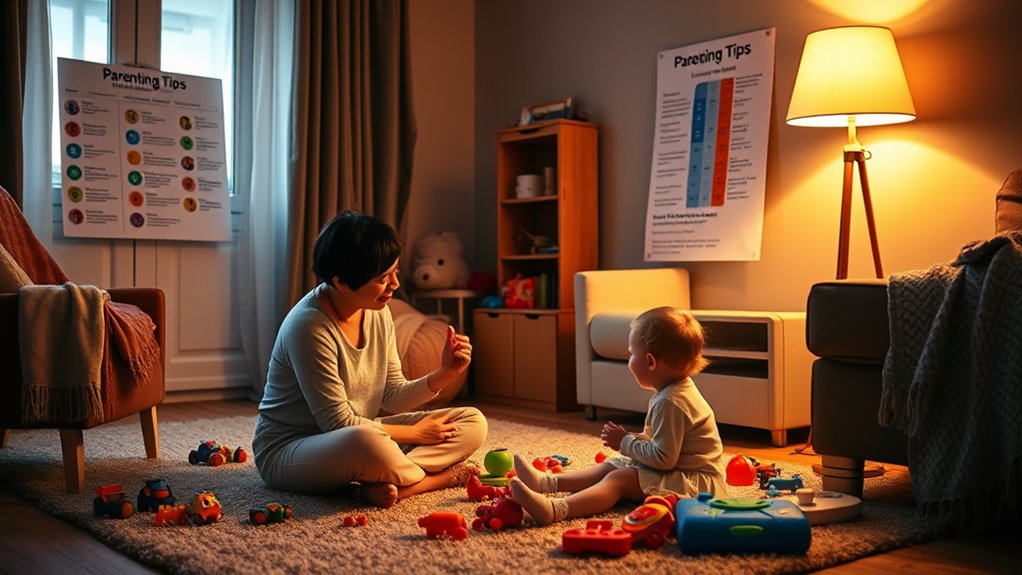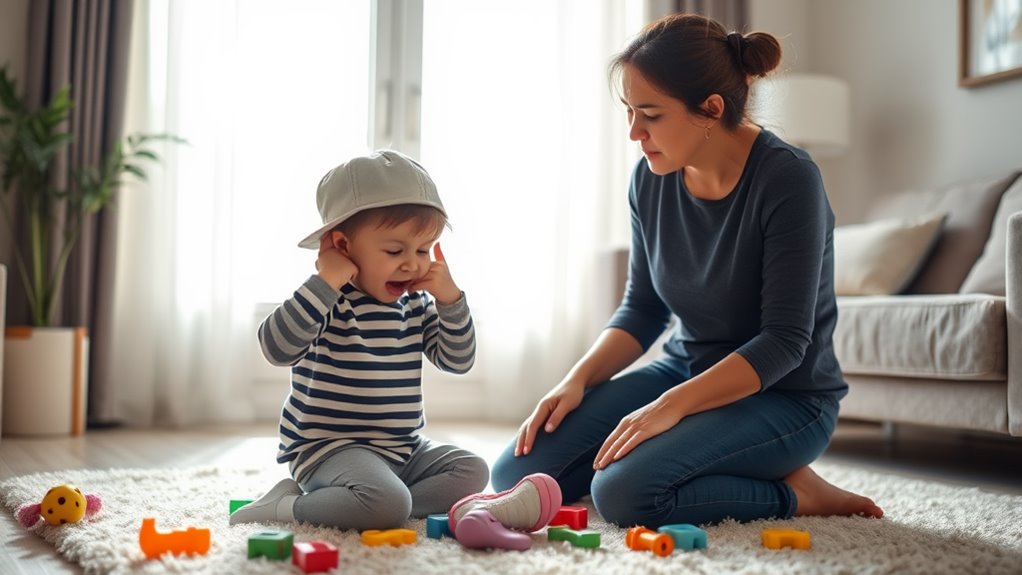Modern parenting seminars are packed with innovative techniques that’ll help you bond with your kids and tackle daily hurdles. You’ll learn about emotional intelligence, which helps you understand and talk about feelings better. Open communication is key, so practicing active listening can make a world of difference. You can also discover the power of positive reinforcement—celebrating effort boosts confidence! Plus, establishing routines keeps things on track. And don’t forget about technology; managing screen time wisely can keep everyone engaged in real-life fun. Stick around, and you’ll uncover even more fun strategies to enhance your parenting journey!
Understanding Emotional Intelligence
Emotional intelligence is an essential skill that shapes how you and your children navigate relationships and handle challenges. It’s all about understanding your feelings and the feelings of others. When you recognize emotions, you can respond better, whether it’s comforting a friend or resolving a conflict at home.
Think of emotional intelligence as a superpower. You can notice when your child’s mood shifts, and instead of brushing it off, you can ask, “What’s up?” This simple question opens the door to deeper conversations. You’re not just a parent; you’re a detective, figuring out what makes emotions tick!
Your kids learn by watching you, so when you handle tough situations with empathy, they pick up on that. Celebrate their wins and help them learn from mistakes. It’s like building a bridge of trust that leads to healthy communication.
Plus, emotional intelligence isn’t just for kids. You’ll benefit too! You’ll find yourself feeling more connected and less stressed.
Encouraging Open Communication
Consistently encouraging open communication with your children fosters a safe space where they feel comfortable expressing their thoughts and feelings. When you make it easy for them to share, they’re more likely to open up about their day, their dreams, or even their worries.
So, how can you do this? Start by actively listening. Put down your phone, make eye contact, and show genuine interest in what they’re saying.
You can ask open-ended questions like, “What was the best part of your day?” instead of just “Did you have a good day?” This invites them to share more than just a yes or no answer.
Also, share your own thoughts and feelings! Let them see that it’s okay to talk about emotions, whether they’re happy, sad, or even confused. This creates a two-way street for communication.
And remember, it’s not just about big topics. Celebrate the little things too! Ask about their favorite game or the book they’re reading.
You’ll be amazed at how these simple conversations can strengthen your bond. Plus, who knows? You might learn a thing or two about their world!
Implementing Positive Reinforcement
Building on the foundation of open communication, implementing positive reinforcement can greatly enhance your child’s behavior and self-esteem. When you catch your child doing something good, celebrate it! A simple “Great job!” or a high-five can work wonders. Kids love to know that you notice their efforts, and it encourages them to keep it up.
Try setting up a reward system, too. You could use stickers or points for positive actions. Once they collect a certain number, they can choose a fun reward, like a movie night or a special treat. It’s like turning good behavior into a game—who doesn’t love games?
Make sure to be specific about what you’re praising. Instead of just saying, “You’re awesome,” you could say, “I love how you shared your toys with your friend!” This helps them understand exactly what they did right. Plus, it feels more genuine.
Practicing Mindful Parenting
Practicing mindful parenting means being fully present and engaged with your child in each moment. It’s about tuning in to what they’re saying and feeling, rather than just going through the motions. When you listen to your child, try to understand their thoughts and emotions. This can help you connect better and build trust.
You might find it helpful to set aside distractions. Put down your phone, turn off the TV, and really focus on your child. When they share a story or ask a question, give them your full attention. You’ll notice how much more meaningful those moments become!
Mindful parenting also means being aware of your own feelings. If you’re stressed or upset, your child might pick up on that. Take a deep breath, and remind yourself that it’s okay to feel what you’re feeling.
Establishing Consistent Routines
A well-structured routine can be a game-changer for your family. It helps everyone know what to expect, making daily life smoother and less chaotic.
Imagine waking up each morning to a predictable schedule. Breakfast at the same time, chores right after, and then some fun activities. Sounds nice, right?
Creating a routine doesn’t have to feel like a chore, either. Start small! Pick a few key activities to do at the same time each day. You could have family game night every Friday or story time before bed.
Kids thrive on consistency, and when they know what comes next, it reduces tantrums and surprises.
Don’t forget to include some flexibility, though. Life happens, and it’s okay to adapt your routine when needed. You can even involve your kids in making the schedule. Letting them pick out some activities gives them a sense of ownership.
Plus, routines can make family time feel special. When you all sit down for dinner together, it’s a chance to connect and share your day.
Fostering Independence in Children
Establishing routines not only creates structure but also sets the stage for fostering independence in children. When you give your kids a consistent schedule, they start to understand what’s expected of them, and they learn to manage their time better.
Isn’t it amazing when you watch them thrive on their own?
Encourage your children to take charge of small tasks. For instance, let them pick out their clothes or pack their own lunches. It’s fun to watch them make choices, and it builds their confidence!
You might even find that they surprise you with their creativity—who knew peanut butter and pickles could be a thing?
Don’t forget to celebrate their achievements, no matter how small. A simple high-five or a cheerful “You did it!” can go a long way.
When they succeed, they’ll want to try even harder.
Of course, mistakes will happen. Instead of stepping in immediately, give them a chance to figure it out.
This not only promotes problem-solving skills but also teaches them that it’s okay to stumble.
Independence is like a plant; with the right care and encouragement, it’ll bloom beautifully!
Utilizing Technology Wisely
In today’s digital age, finding a balance with technology can feel overwhelming, but it’s essential for your child’s development. You want to harness the power of tech without letting it take over your family life. Start by setting clear limits on screen time. Kids need that face-to-face interaction, so make sure they’ve plenty of opportunities for real-world play.
Next, choose age-appropriate content. There are tons of educational apps and games that can be both fun and beneficial. You’ll want to explore these options together, sparking conversations about what they’re learning. This not only keeps you in the loop but also helps you bond!
Don’t forget about being a role model. If you’re glued to your phone during family time, your kids might think that’s okay. Show them how to use technology wisely by setting aside your devices when it’s time to connect with each other.
Lastly, encourage them to explore their creativity online. Whether it’s coding, digital art, or writing a blog, these activities can keep them engaged and help them develop essential skills.
With a little guidance, you can help your child thrive in this tech-filled world!
Nurturing Social Skills
Social skills are essential for your child’s emotional and social development. They help your little one make friends, share toys, and solve problems.
So, how can you nurture these skills? Start by encouraging playdates. When kids interact, they learn to communicate, share, and even negotiate! Plus, you can be nearby to guide them if things get a bit too wild.
Another great way to build social skills is through group activities like sports or art classes. These settings let kids work together, learn teamwork, and celebrate each other’s successes.
You could even host game nights at home, where they can practice taking turns and being good winners or losers—because let’s face it, nobody likes a sore loser!
Don’t forget to model good social behavior yourself. Show your child how to greet people, say thank you, and express empathy. Kids learn a lot by watching you!
Finally, sprinkle in some humor. Laughing together not only strengthens bonds but also teaches kids to lighten up when things don’t go as planned.
Balancing Screen Time
While fostering social skills is important, it’s equally essential to manage your child’s screen time effectively. You might think, “But they’re just playing games or watching cartoons!” However, too much screen time can lead to issues like sleep problems or difficulty focusing.
So, how can you strike the right balance?
First, set some rules. Decide how many hours a day are allowed for screens—maybe an hour after homework? And stick to it!
Next, choose age-appropriate content. You want to make sure what they’re watching or playing isn’t only fun but also educational. Encourage them to explore interactive games that promote problem-solving and creativity.
Don’t forget about family time! Use screen-free moments to play board games or go for walks together. This not only strengthens bonds but also creates lasting memories.
Another tip? Lead by example! If you’re always on your phone, your kids might think it’s okay for them too.
Finally, check in with them. Ask what they’re watching or playing, and discuss it together. Making screen time a shared experience can turn a solitary activity into a bonding opportunity!
Building Resilience in Kids
Building resilience in kids is essential for their long-term success and well-being. When kids learn to bounce back from challenges, they develop confidence and the ability to handle life’s ups and downs.
So, how can you help your child become more resilient? Start by allowing them to face age-appropriate challenges. If they struggle with a puzzle, don’t immediately swoop in to help. Instead, encourage them to figure it out on their own. It builds problem-solving skills, and trust me, they’ll feel like superheroes when they succeed!
Another great technique is to foster a growth mindset. Teach your kids that mistakes are just stepping stones to success. You can say, “It’s okay to fail, but let’s learn from it!” This attitude helps them see setbacks as opportunities rather than roadblocks.
Also, make sure to celebrate their efforts, not just their achievements. A simple “I’m proud of you for trying” can work wonders.
Finally, model resilience yourself. Share your own stories of overcoming obstacles, because let’s face it, everyone loves a good comeback story!
With these strategies, you’ll help your kids build resilience, and who knows? They might just inspire you too!





